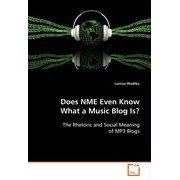
I, like many MP3 bloggers, am deeply disturbed by the information gathered on a post over at The Vinyl Villain. JC has collected links to the following posts that all address the current censorship and bullying that is taking place in the MP3 blogosphere:
To Die By Your Side Post
Song, By Toad Post
Teenage Kicks Post
17 Seconds Post
I encourage you to read them all because each of them provides a slightly different insight into the rash of MP3 blog post removals, specifically by Google's Blogger. I would also like to add a couple of my own links to relevant stories, including this story about Metallica and the Muxtape story. Now, as many of you know, I've been studying MP3 blogging with a fair amount of depth this past year, and as far as I could tell, most MP3 bloggers appeared safe from legal action because of the ephemeral nature of most download links, because of their disclaimers about asking for removal of MP3s, and because of the fact that as long as they posted only a few MP3s, and not full albums, they were operating under the following "fair use" clause of the Copyright Law:
"Notwithstanding the provisions of sections 106 and 106A, the fair use of a copyrighted work, including such use by reproduction in copies or phonorecords or by any other means specified by that section, for purposes such as criticism, comment, news reporting, teaching (including multiple copies for classroom use), scholarship, or research, is not an infringement of copyright. In determining whether the use made of a work in any particular case is a fair use the factors to be considered shall include—
(1) the purpose and character of the use, including whether such use is of a commercial nature or is for nonprofit educational purposes;
(2) the nature of the copyrighted work;
(3) the amount and substantiality of the portion used in relation to the copyrighted work as a whole; and
(4) the effect of the use upon the potential market for or value of the copyrighted work.
The fact that a work is unpublished shall not itself bar a finding of fair use if such finding is made upon consideration of all the above factors."
As evident through the above bloggers' stories, this safety net has been torn from under us. Now there are talks of blogs disappearing and/or going underground (ie: email subscription services), but what I fail to understand is what record labels hope to gain by attacking MP3 blogs. Have they heard of torrents? Is it because it's easier to target a bunch of relatively small static entities rather than massive networks whirling around the globe? To treat MP3 blogs and their offshoots as though they're the same as the P2P filesharing frenzy started by Napster in the late 90s, is utterly ridiculous. There are so many flaws in these actions on the part of both major record labels and Google, but I would like to point out a few pertinent ones.
Firstly, how can archaic copyright laws be applied to drastically new developments in technology? How can you steal something whilst leaving it with the person you "stole" it from? This process is one of cloning, not of physical products leaving one spatial location to be in another. And after being in academia so long, I know the copyright law well enough - of course you can't photocopy a whole book, but you can definitely copy portions that you need for your studies. The reason why this analogy doesn't quite work is because photocopying a book would be a lot more time-consuming than downloading and burning an album or several. But I would like to point out the fact that research and epistemological processes have been built upon the foundation of citation. You cannot write an academic piece of literature without references, citations and examples from previous works to bolster your argument. Well, MP3s are bolstering our arguments. We are not plagiarizing entire books, we are providing our examples. Consider our MP3 links to be inside quotation marks.
Ideas and art do not spring from a vacuum. This is the civilized world that literacy ushered in. Once thoughts and information could be recorded for reference, they could be easily used to continue building on, generating a sense of progress. Science and technology themselves couldn't have gone anywhere without the free flow and dissemination of information. Knowledge generates knowledge, and by preventing access to ideas and cultural artifacts, big businesses are only killing civilization as we know it. However, when you take a look at the history of communication, we are merely repeating it. When the printing press became more widespread, copyright laws were created by those that feared losing power, and restrictions were placed on who could produce printed news and books, but eventually, progress broke the elitist hold and the presses were opened again. This is not to say that censorship isn't alive and well and that "free" societies are actually completely free and democratic.
In the current state of the world, it is becoming increasingly apparent that information is the new power, not military. Wars shall be fought with information and gathered intelligence - knowledge is indeed power. Chomsky and Herman's Propaganda Model makes the point that journalism is greatly shaped and filtered by restricting means of production and communication to only those who have the financial means to do so. These filters are firmly entrenched in the world of journalism, so much so that they tend to be invisible to most people. I suggest you read Manufacturing Consent to illuminate this fraudulent concept of freedom of speech. My worry is how these filters will eventually find their way from the world of "official" journalism to the world of "unofficial" journalism. In some ways, they already have. For those without the money for a computer or high-speed Internet, MP3 blogging wouldn't be an option in the first place. But soon the privileged, but non-elite people who maintain MP3 blogs could be silenced, too. If more of the financial elite get control over the Internet and its applications, the supposed freedom of online communcation and creation will completely disappear. My only hope is that there will continually be innovative people one step ahead, using their individual brains and sources of knowledge.
The issue here is primarily MP3s - I highly doubt blogs that merely discuss music without free downloads are being targeted in the same way. In many ways, MP3s are art, but they are also literally encoded information, so by stopping bloggers from using a few samples, music labels are obstructing the flow of information and attempting to curtail individuals thinking for themselves. Music fans are gaining power through being able to sample before buying, so record labels need only fear if their artists aren't good enough to convince people to purchase their product. It's hard to believe that the people in charge of the music industry have any business acumen at all with the absurd strategies they're using. These strategies include the hidden Copyrighting Board Private Copying Tariff on the prices of blank audio cassettes and blank CDRs.
Secondly, it seems mad that record labels haven't learned from their first go-round in which they fought the very technology that affected the future of their industry/commodity. Now, they're fighting the future of music publicity. It's like reaching for the bail bucket on the Titanic. The removal of MP3 blog posts is a pyrrhic victory for the music industry and a classic case of the music industry gnawing on the hand that feeds it. To attack people who have provided disclaimers and expired links, is an exercise in futility and ends up infringing on the property of others. And these others are the "real" music fans -the ones who actually buy music and go to live shows as opposed to the casual music fans who don't care whether they get all their music from torrents and who will likely never be the target market for excessive music buying.
It appears that Coxon of To Die By Your Side could have been targeted because he wrote a critical review of Cold War Kids' latest album. Well, I did, too - here. And perhaps one of the reasons I haven't had my post removed yet is because I'm still flying under the radar and not generating huge traffic. I, like most other bloggers, have had plenty of positive feedback from the artists themselves, who are happy that their art is being exposed to the public by people who are just as passionate about it as they are. Unlike the music industry, and to an increasingly greater extent, the music journalism industry, many MP3 bloggers view music as art, not as strictly a commodity. If the music industry is so in tune with the laws of capitalism, they should recognize the moment when a business has to adapt or die - that moment has already come and gone, but the industry has found no viable solution for itself; thus, industry people busy themselves by bullying those that can't feasibly fight back so that they can feel proactive rather than the lumbering retroactive people they are.
Fear generates fear. The obsolete middlemen in the music industry are fearing for their livelihoods, and are thus using fear tactics upon both blog hosts like Google and MP3 bloggers. I refuse to be fearful. If and when it comes to sounding my last post, I, along with other music fans, will find a new way of communicating because the process that literacy set in motion cannot be stopped. If we are to be viewed as shoplifters, then all I have to say is: Shoplifters of the world unite and take over.
Shoplifters Of the World Unite - The Smiths
Can the Haves Use Their Brains - McCarthy
To Die By Your Side Post
Song, By Toad Post
Teenage Kicks Post
17 Seconds Post
I encourage you to read them all because each of them provides a slightly different insight into the rash of MP3 blog post removals, specifically by Google's Blogger. I would also like to add a couple of my own links to relevant stories, including this story about Metallica and the Muxtape story. Now, as many of you know, I've been studying MP3 blogging with a fair amount of depth this past year, and as far as I could tell, most MP3 bloggers appeared safe from legal action because of the ephemeral nature of most download links, because of their disclaimers about asking for removal of MP3s, and because of the fact that as long as they posted only a few MP3s, and not full albums, they were operating under the following "fair use" clause of the Copyright Law:
"Notwithstanding the provisions of sections 106 and 106A, the fair use of a copyrighted work, including such use by reproduction in copies or phonorecords or by any other means specified by that section, for purposes such as criticism, comment, news reporting, teaching (including multiple copies for classroom use), scholarship, or research, is not an infringement of copyright. In determining whether the use made of a work in any particular case is a fair use the factors to be considered shall include—
(1) the purpose and character of the use, including whether such use is of a commercial nature or is for nonprofit educational purposes;
(2) the nature of the copyrighted work;
(3) the amount and substantiality of the portion used in relation to the copyrighted work as a whole; and
(4) the effect of the use upon the potential market for or value of the copyrighted work.
The fact that a work is unpublished shall not itself bar a finding of fair use if such finding is made upon consideration of all the above factors."
As evident through the above bloggers' stories, this safety net has been torn from under us. Now there are talks of blogs disappearing and/or going underground (ie: email subscription services), but what I fail to understand is what record labels hope to gain by attacking MP3 blogs. Have they heard of torrents? Is it because it's easier to target a bunch of relatively small static entities rather than massive networks whirling around the globe? To treat MP3 blogs and their offshoots as though they're the same as the P2P filesharing frenzy started by Napster in the late 90s, is utterly ridiculous. There are so many flaws in these actions on the part of both major record labels and Google, but I would like to point out a few pertinent ones.
Firstly, how can archaic copyright laws be applied to drastically new developments in technology? How can you steal something whilst leaving it with the person you "stole" it from? This process is one of cloning, not of physical products leaving one spatial location to be in another. And after being in academia so long, I know the copyright law well enough - of course you can't photocopy a whole book, but you can definitely copy portions that you need for your studies. The reason why this analogy doesn't quite work is because photocopying a book would be a lot more time-consuming than downloading and burning an album or several. But I would like to point out the fact that research and epistemological processes have been built upon the foundation of citation. You cannot write an academic piece of literature without references, citations and examples from previous works to bolster your argument. Well, MP3s are bolstering our arguments. We are not plagiarizing entire books, we are providing our examples. Consider our MP3 links to be inside quotation marks.
Ideas and art do not spring from a vacuum. This is the civilized world that literacy ushered in. Once thoughts and information could be recorded for reference, they could be easily used to continue building on, generating a sense of progress. Science and technology themselves couldn't have gone anywhere without the free flow and dissemination of information. Knowledge generates knowledge, and by preventing access to ideas and cultural artifacts, big businesses are only killing civilization as we know it. However, when you take a look at the history of communication, we are merely repeating it. When the printing press became more widespread, copyright laws were created by those that feared losing power, and restrictions were placed on who could produce printed news and books, but eventually, progress broke the elitist hold and the presses were opened again. This is not to say that censorship isn't alive and well and that "free" societies are actually completely free and democratic.
In the current state of the world, it is becoming increasingly apparent that information is the new power, not military. Wars shall be fought with information and gathered intelligence - knowledge is indeed power. Chomsky and Herman's Propaganda Model makes the point that journalism is greatly shaped and filtered by restricting means of production and communication to only those who have the financial means to do so. These filters are firmly entrenched in the world of journalism, so much so that they tend to be invisible to most people. I suggest you read Manufacturing Consent to illuminate this fraudulent concept of freedom of speech. My worry is how these filters will eventually find their way from the world of "official" journalism to the world of "unofficial" journalism. In some ways, they already have. For those without the money for a computer or high-speed Internet, MP3 blogging wouldn't be an option in the first place. But soon the privileged, but non-elite people who maintain MP3 blogs could be silenced, too. If more of the financial elite get control over the Internet and its applications, the supposed freedom of online communcation and creation will completely disappear. My only hope is that there will continually be innovative people one step ahead, using their individual brains and sources of knowledge.
The issue here is primarily MP3s - I highly doubt blogs that merely discuss music without free downloads are being targeted in the same way. In many ways, MP3s are art, but they are also literally encoded information, so by stopping bloggers from using a few samples, music labels are obstructing the flow of information and attempting to curtail individuals thinking for themselves. Music fans are gaining power through being able to sample before buying, so record labels need only fear if their artists aren't good enough to convince people to purchase their product. It's hard to believe that the people in charge of the music industry have any business acumen at all with the absurd strategies they're using. These strategies include the hidden Copyrighting Board Private Copying Tariff on the prices of blank audio cassettes and blank CDRs.
Secondly, it seems mad that record labels haven't learned from their first go-round in which they fought the very technology that affected the future of their industry/commodity. Now, they're fighting the future of music publicity. It's like reaching for the bail bucket on the Titanic. The removal of MP3 blog posts is a pyrrhic victory for the music industry and a classic case of the music industry gnawing on the hand that feeds it. To attack people who have provided disclaimers and expired links, is an exercise in futility and ends up infringing on the property of others. And these others are the "real" music fans -the ones who actually buy music and go to live shows as opposed to the casual music fans who don't care whether they get all their music from torrents and who will likely never be the target market for excessive music buying.
It appears that Coxon of To Die By Your Side could have been targeted because he wrote a critical review of Cold War Kids' latest album. Well, I did, too - here. And perhaps one of the reasons I haven't had my post removed yet is because I'm still flying under the radar and not generating huge traffic. I, like most other bloggers, have had plenty of positive feedback from the artists themselves, who are happy that their art is being exposed to the public by people who are just as passionate about it as they are. Unlike the music industry, and to an increasingly greater extent, the music journalism industry, many MP3 bloggers view music as art, not as strictly a commodity. If the music industry is so in tune with the laws of capitalism, they should recognize the moment when a business has to adapt or die - that moment has already come and gone, but the industry has found no viable solution for itself; thus, industry people busy themselves by bullying those that can't feasibly fight back so that they can feel proactive rather than the lumbering retroactive people they are.
Fear generates fear. The obsolete middlemen in the music industry are fearing for their livelihoods, and are thus using fear tactics upon both blog hosts like Google and MP3 bloggers. I refuse to be fearful. If and when it comes to sounding my last post, I, along with other music fans, will find a new way of communicating because the process that literacy set in motion cannot be stopped. If we are to be viewed as shoplifters, then all I have to say is: Shoplifters of the world unite and take over.
Shoplifters Of the World Unite - The Smiths
Can the Haves Use Their Brains - McCarthy





















































3 comments:
Excellent -will be posting a link to this over at 17 Seconds
I had the same thing and was blog-busted for probably posting a Prince tune in the same week.
And as you say torrents are where the real piracy happens, not music blogs where it's passionate cyber-babble about rock and pop. I've actually had Q and A's with several performers on my blog - The Undertones, Marco Pirroni, Brian James - who've all endorsed the use of MP3s in the related posting.
And here's a thing- what about a libraries? Not that I'm against them in any way, far from it. But they offer a mighty selection of music that anyone can borrow for some loose change charge and return a few days/weeks later.
Do music exec's really think these borrowers will not make a copy of the lent item during their loan period. I would imagine the turn over on these(generally mainstream) items reduces the potential take-up by buyers significantly more, the downloaded scraps of oddities and obscurities found on music blogs.
Hear, Hear! Anglopunk!
Post a Comment